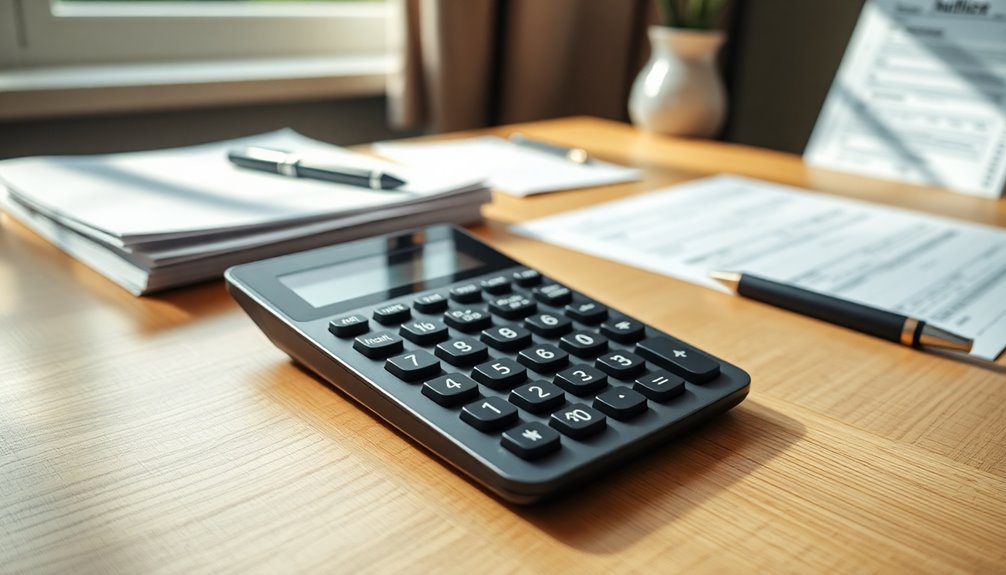You can't deduct personal rent on your federal taxes, but some state-specific tax benefits might apply. For example, states like New Jersey and New York offer credits to eligible renters. If you run a business, though, you can typically deduct commercial rent, provided it's used for business activities. Make sure you keep accurate records and check your state's rules for eligibility. If you're 65 or older, or partially blind, you could also receive increased deductions. There's a lot more to understand about these deductions and tax benefits that could impact you.
Key Takeaways
- Personal rent for a primary residence is not tax-deductible at the federal level.
- Certain states offer tax benefits for renters, such as credits and deductions based on income or rent paid.
- Business rent for commercial properties is tax-deductible if used for business activities with proper documentation.
- Rent deductions can be claimed for home office expenses using either the simplified or actual expense methods.
- Consulting a tax professional can help identify eligible deductions and ensure compliance with state-specific rules.
Federal Tax Deduction Overview

Understanding federal tax deductions is crucial for maximizing your tax savings. You have two main types of deductions to consider: the standard deduction and itemized deductions.
The standard deduction is a fixed amount you can deduct from your taxable income without the hassle of itemizing. For 2024, this amounts to $14,600 for singles, $29,200 for joint filers, and $21,900 for heads of household. If you're 65 or older or partially blind, you can get an increased deduction, and these amounts are adjusted for inflation. Tax code allows for deductions to prevent double taxation on income.
On the other hand, itemized deductions require you to list specific expenses such as mortgage interest, state and local taxes, charitable contributions, and certain medical expenses.
For instance, you can deduct mortgage interest on home loans up to $750,000 (or $1 million for homes purchased before December 16, 2017). You can also deduct up to $10,000 in state and local taxes and up to $2,500 for student loan interest.
Understanding these deductions helps you choose the best strategy for your tax situation, potentially leading to significant savings.
Personal vs. Business Rent

When it comes to rent, distinguishing between personal and business expenses is essential for tax purposes. Personal rent, like what you pay for your primary residence, isn't tax-deductible. The IRS doesn't allow deductions for rent paid on properties used solely for personal purposes, meaning you can't claim that expense on your taxes.
On the other hand, business rent can be tax-deductible. If you rent commercial space for your business, you can typically deduct that expense, provided the space is used explicitly for business activities. Small business expenses must be directly related to business operations to qualify for deductions.
If you use a property for both personal and business purposes, you'll need to determine which portion of the rent applies to your business use. Calculate this by assessing the square footage of your workspace compared to the total property size.
To claim your business rent as a deduction, it's important to maintain proper documentation, including a valid lease agreement. This should detail the rental amount, duration, and any restrictions on use.
State-Specific Tax Benefits

Many renters may not realize that certain states offer tax benefits specifically for rental payments. For instance, if you live in California, you could qualify for a tax credit if you paid rent for at least half the year and meet specific income thresholds—single filers earning less than $50,746 may receive between $60 and $120.
In New York, renters paying $450 or less might earn a credit worth up to $375, depending on age and income.
Indiana allows you to deduct up to $3,000 if your rental property is your principal residence and subject to property tax. Additionally, it's worth noting that some states offer tax credits or deductions for renters, which can significantly enhance your financial relief.
New Jersey takes it a step further by letting eligible renters claim up to 18% of their rent as a property tax deduction.
To take advantage of these benefits, you must be a resident of the state and have your name on the lease. Additionally, keeping accurate records of your rent payments is essential for claiming these deductions and credits.
Always check with your state's department of revenue or consult a tax professional to ensure you meet all requirements.
Eligibility for State Credits

Eligibility for state credits can be a straightforward process if you meet the necessary criteria. First, you must be a resident of the state where you're renting. This typically means living there for a specified period, such as the entire year in Arizona or at least nine months in Montana. Some states require you to be physically present for a certain number of days, like 183 days in Minnesota.
Next, ensure the property you're renting isn't exempt from property taxes, and your name is on the lease. This makes you legally responsible for paying rent. Additionally, the property owner must be paying taxes on the property, and you must be renting a primary residence, as required in states like Michigan. Many states require specific age and income requirements to qualify for renters tax credits.
Your dependency status also plays a crucial role. You can't be claimed as a dependent on someone else's federal tax return in states like California or Minnesota.
Finally, remember that you must apply for the credit every year, following specific state guidelines for documentation and forms. Meeting these criteria can help you access potential state credits successfully.
Income and Age Limitations

While federal tax rules don't impose any income or age limitations on rent deductions—mainly because they don't allow for personal rent deductions—state-level options can vary significantly.
Some states offer renter tax credits or deductions, often dependent on your income. For instance, in California, single filers must earn less than $50,746, while married filers have a threshold of $101,492.
In New York, you could qualify for a credit up to $375, but you'll need to meet specific age and income requirements.
Indiana allows a deduction up to $3,000, provided you meet income and residency conditions. In contrast, New Jersey lets you consider up to 18% of your rent as property taxes, without any age limitations.
To take advantage of these state-level benefits, you'll need to confirm your eligibility based on the specific income and residency criteria in your state. Additionally, it's important to note that rental properties are classified as passive activities under federal tax rules, which could affect your overall tax strategy.
While federal rules are straightforward, state regulations can introduce complexities that might affect your ability to claim rent-related benefits. Always check your state's guidelines to understand what might apply to you.
Additional State Requirements

When claiming state-level rent deductions or credits, you need to navigate a variety of additional requirements that can vary widely by state. First, establish your residency; most states require you to be a resident and taxpayer, often needing you to spend a specific number of days in the state.
For instance, California mandates you're present for at least 183 days, while Colorado requires you to live there for the entire year.
Next, ensure the rental property is your primary residence, and your name must be on the lease. That means you're responsible for rent payments. In some states, the property must be subject to property tax, and you may benefit from deductions if your landlord pays these taxes. Additionally, many states offer various tax credits or deductions for renters, which can further reduce your tax burden.
Additionally, review dependency rules. You can't be claimed as a dependent by someone else, although exceptions exist for those aged 65 or older in certain states.
Lastly, be aware that if you received a property tax exemption during the tax year, it could disqualify you from claiming rent deductions. Each state has unique criteria, so make sure to familiarize yourself with your state's specific rules.
How to Claim Deductions

Understanding how to claim deductions can significantly impact your tax situation, especially if you qualify for state-level renter's credits. While there's no federal deduction for residential rent, you might benefit from a home office deduction if you're self-employed, a business owner, or a contractor using your space exclusively for work. Additionally, knowing the financial implications of such deductions can help you make informed decisions about your expenses.
To claim this deduction, determine if you'll use the simplified method or the actual expense method. The simplified method allows you to deduct $5 per square foot of your home office, up to 300 square feet. Alternatively, with the actual expense method, you'll need to calculate the real costs, including rent, utilities, and repairs. Additionally, self-employed individuals can also benefit from retirement plan contributions that provide immediate tax breaks.
For filing, report the simplified deduction on line 30 of Schedule C, or use IRS Form 8829 for the actual expense method.
For state-specific credits, check your state's rules. Keep detailed records of rent payments and documentation, as some states require landlords to pay property taxes for you to qualify.
Finally, file the deduction or credit using your state tax return form to benefit from any available credits.
Consulting Tax Professionals

Consulting tax professionals can be a game changer for navigating the complexities of rent deductions. They can help you determine if your rental space qualifies for deductions, especially if you use it for both personal and business purposes. By understanding the nuances of deductible expenses, these experts ensure you only claim the portion tied directly to your business activities.
Tax professionals can also guide you through the different calculation methods for home offices or external workspaces. They'll clarify the simplified option versus the actual expense method, helping you maximize your deductions while staying compliant with IRS regulations. This is vital when it comes to maintaining meticulous records of rent payments and lease agreements, which can protect you during an audit. Additionally, they can assist you in understanding how operating expenses like rent are crucial for accurately reporting your business costs.
Moreover, they can advise on how rent expenses impact your specific business structure, whether you're a sole proprietor or part of an LLC. They'll also inform you about strategic moves like prepaying rent to reduce taxable income.
Ultimately, partnering with a tax professional not only simplifies the process but can also save you money and stress in the long run.
Frequently Asked Questions
Can I Deduct Rent if I Work From Home?
If you work from home, you might be able to deduct rent, but it depends on your situation.
Only freelancers, independent contractors, and business owners qualify, while W-2 employees can only deduct if they also receive 1099 income.
Your workspace needs to be used regularly and exclusively for work.
To claim the deduction, keep track of your rent payments and calculate the business-use percentage of your home.
Always consult a tax professional for guidance.
What if My Landlord Pays Property Taxes?
If your landlord pays property taxes, you typically don't have to worry about paying those directly.
Your rent might include a portion that covers these taxes, so it's essential to check your lease agreement.
Remember, even if your landlord handles the taxes, any increase in property taxes might lead to higher rent for you.
Ultimately, the landlord manages the tax payments and may pass those costs onto you in rent adjustments.
Are There Deductions for Utilities or Maintenance Costs?
Yes, you can deduct certain utilities and maintenance costs if you're a landlord.
Utilities for rental properties, even if they're vacant, are deductible. Maintenance expenses are also deductible if they're necessary repairs, not improvements.
Minor repairs can be deducted immediately, while major ones might need to be depreciated. Keeping accurate records is essential to ensure you maximize your deductions when filing your taxes.
Consulting a tax professional can provide tailored advice for your situation.
How Do I Prove My Residence for State Credits?
To prove your residence for state credits, gather documents like utility bills, rent receipts, or a lease agreement showing your name and address.
Ensure you've registered to vote and updated your driver's license in the state.
Keeping financial records, like bank statements with your current address, also helps.
Track any days spent in the state and obtain any necessary statements from local organizations to strengthen your residency claim.
Can Roommates Claim Deductions for Shared Rent Payments?
When you share rent with roommates, you can't claim deductions for shared rent payments unless there's a formal rental agreement and you're paying at fair market value.
If it's just a cost-sharing arrangement, you won't report any income, and deductions won't apply.
Remember, only expenses directly associated with renting a space can be deducted, and personal use can limit those deductions.
Always keep clear records to support your claims if needed.
Conclusion
In summary, while you can't typically deduct personal rent from your federal taxes, there are options for business rent and potential state-specific benefits. Make sure to check your state's regulations and eligibility requirements, as they can vary. If you're unsure about your situation, consulting a tax professional can help you navigate the complexities and maximize your deductions. Stay informed and proactive about your tax strategy to ensure you're making the most of your expenses.









